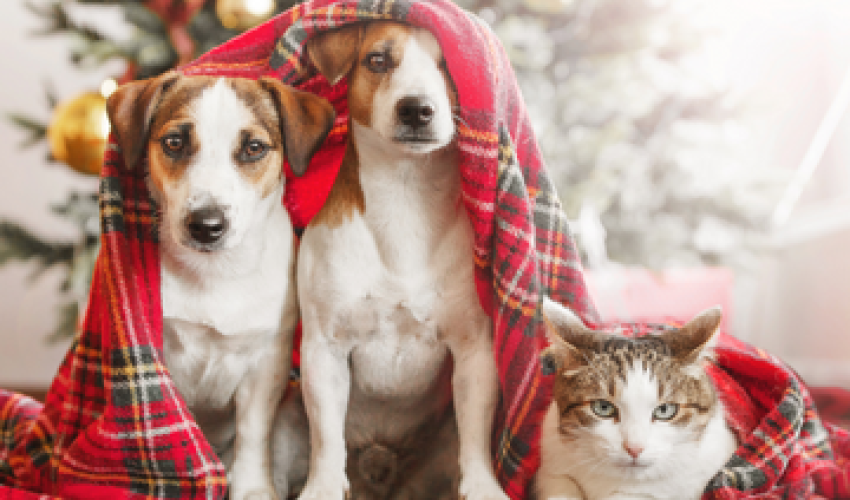
The holidays can be a wonderful time of togetherness, and obviously, you want your family's fur babies to take part in all of the festivities. This may tempt you to give them some extra treats off the buffet table. It's okay to spoil your pets once in a while, but it is important to remember that a lot of our favorite holiday foods have ingredients that can be harmful to animals.
Don't let a fun holiday turn into a disaster; avoid feeding your pets these holiday foods.
Fatty Foods
When preparing holiday dishes, we often neglect to count the calories. Keep in mind that fatty foods, while delicious, are difficult for pets to digest. Too much fat inflames the pancreas and wreaks havoc on the digestive system. Avoid giving your pet turkey or chicken skin, fried dishes, gravies, or desserts full of butter and cream.
Bones
A dog chewing on a bone is such a fixed image that it seems perfectly natural. Unfortunately, natural isn't always healthy. Pets can choke on pieces of bone, or bone splinters can become lodged in the digestive system. Cooked bones are particularly dangerous as they become brittle from the cooking process.
If you want to give your pet a bone, skip the table scraps and pick up a raw bone that is safer from your local pet shop. Call us for recommendations.
Onions and Garlic
Fragrant onions and garlic are the base for so many holiday foods. If any food on your table contains either of these ingredients, they should be off-limits to your pets. Onions, garlic, shallots, scallions, leeks, and chives are members of the allium family. This group of vegetables has components that damage the red blood cells of dogs and cats and can cause gastrointestinal irritation.
You may have noticed that some pet foods and pet-friendly recipes list garlic as an ingredient. There is some debate about how much garlic a dog or cat can have in a day; call us if you have any questions.
Chocolate
Most dog owners have it drilled into them that chocolate is bad for dogs, but did you know it is also bad for your kitty? As good as chocolatey treats are, chocolate contains theobromine, which is toxic to our pets. Cats and dogs are also much more sensitive to the effects of caffeine, which is also in chocolate. Eating chocolate can cause digestive issues, vomiting, diarrhea, heart arrhythmia, or even seizures! Keep the chocolate far away from the pets during the holidays, and contact your vet immediately if they get into it.
Alcoholic Beverages
As a responsible pet parent, you probably know enough not to crack open a couple of brews with your dog and cat. During the holiday season, however, when people are drinking and leaving cups all over the house, your furry friends might get an inkling to help themselves. That, or they might get their noses into a slice of rum-soaked fruitcake left on the coffee table. Because the alcohol is hidden in rich, sweet drinks and treats, it will be tempting to your pets. Be extra vigilant.
Raisins/Grapes
Grapes, and their dehydrated counterpart—raisins—have toxins that can cause kidney failure in dogs and cats. Keep the fruit baskets off accessible surfaces if grapes tempt your pets, and also keep any dishes with raisins out of reach. If a dog or cat eats grapes or raisins, he may become hyperactive or begin suddenly vomiting. If you suspect your pet got into any grapes or raisins, contact your vet ASAP.
Nuts
This is a tricky one because you probably thought nuts were good for your pet. After all, what dog doesn't love a little peanut butter treat now and then? It's true, some nuts are safe for pets, but not all nuts are created equal. Almonds, walnuts, macadamia nuts, raw cashews, pecans, and pistachios have different chemicals that may upset your dog's stomach.
Milk Products
Just like a dog and his bone, it seems perfectly normal for a cat to have a little saucer of milk or cream. Once again, this iconic image is a lie. Most dogs and cats can't tolerate lactose. For cats, in particular, it doesn't take a large dose of dairy to cause acute intestinal distress. If you want to treat your furry friend to a little dairy, consider some lactose-free yogurt (plain and unsweetened).
Yeasty Doughs
Do you remember the awe and wonder you felt the first time you saw a fresh loaf of bread being baked? You put a small ball of dough in a warm place for a couple of hours, and as if by magic it has doubled and tripled in size. Now, just imagine that dough doubling and tripling in your pet's stomach, and you'll see why yeasty doughs can be so unsafe for animals. Your pet's stomach is the perfect environment for the dough to continue rising and expanding, which can cause bloating or, in the worst-case scenario, a rupture. Unbaked doughs are also fermented, which means your pet will absorb the alcohol in them.
If you knew all these foods were bad for your pet, then good for you for doing your research! The problem is, not all humans know, so make sure you relay the information to your family—especially children—who may be around your pets this holiday season.
If you're concerned about your pets eating harmful foods, or if you have any questions, we can help! Call us. The Animal Doctors of Palo Alto, California have been providing high-quality veterinary care for 40 years. We service patients in the San Francisco Peninsula, including Atherton, Cupertino, East Palo Alto, Los Altos, Los Altos Hills, Menlo Park, Mountain View, Palo Alto, Portola Valley, Redwood City, Stanford, and Woodside.


